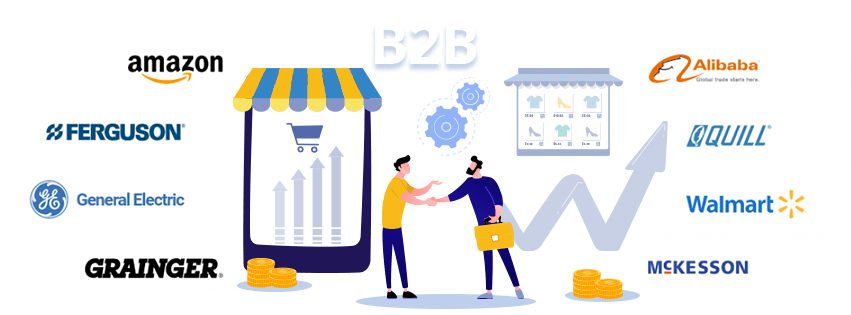Learn the top reasons why all B2B businesses must choose Online marketplace platforms to scale better.
Global B2B eCommerce sales are projected to achieve $7.75 trillion by 2023, said Forbes. The long-run trend is going to exist in places of their B2B eCommerce platform.
Build your Amazon-like multi-vendor marketplace website @ $99/- now!!!
Get your free live demo now: Click here
B2B eCommerce is selling or exchanging products and services between two or more businesses online. A B2B company is primarily a relationship between a manufacturer and a wholesaler, or a wholesaler and a retailer; a supply chain that involves over two companies.
According to Frost & Sullivan’s report, the key force driving the expansion of B2B eCommerce is that of the marketplace model – which brings together large numbers of buyers and vendors onto one eCommerce platform, called the Marketplace website.
An online B2B marketplace acts as middleware of the businessmen where various businesses and corporations like seller and buyer companies including suppliers, importers, exporters, retailers, wholesalers, etc. are ready to connect for selling and buying the assorted products at one digital platform.
Online Marketplace Model: The large Shift for B2B businesses

Big players like Amazon and eBay have completely changed the basic way of how B2B eCommerce operates. And it’s now the time to take a position in and optimize the way buyers purchase directly from their websites, offering more and more services around the sale.
Large B2B retailers today convince their customers to source supplies through online channels, instead of the standard channels like phone, fax, branches, catalog, or sales forces on the bottom.
A study conducted by Forrester found that marketplaces — when efficiently operated — are likely to spice up customer loyalty, boost average order values, and build trust.
Here are the most reasons B2B businesses should extend their eCommerce efforts with their multi-vendor online Marketplace:
Top Reasons why B2B businesses Should Choose Marketplace Model
1. Shifting Buyer Habits
B2B buyers now conduct research on changing the dynamics of how B2B eCommerce works. Nearly 50% of companies with an online storefront estimated that over half their client portfolio would fully or partly migrate to the online channel over the following three years.
Today, 80% of B2B buyers expect the same kind of convenience as similar to the B2C eCommerce websites. It makes them produce a wide array of products to the identical level of convenience as received on B2C sites that tend to supply a broad array of products, convenience, and fair prices. If consumers don’t find what they’re searching for on one site, they quickly switch to the different one.
The key aspects of acquiring and retaining professional customers are identical because of the benefits offered by a Marketplace:
- A compelling breadth of product and repair choices
- Fair and competitive pricing
- High quality of service
- All without incurring overhead like inventory and human resource costs that dig profitability and slow time to promote.
2. Increased Customer Expectations
With increasing the customers’ expectations, every wholesaler must ready to optimize the online shopping experience with respect to buying behavior by following the best practices of the B2C segment.
Amazon is that the perfect reference model for all B2B players investing within the eCommerce channel, most so that companies aspire to recreate the “Amazon experience” on their websites.
Doing so requires increasing the breadth of products offered while keeping the Quality of Service high. These are two essential levers (the other being price) of a good strategy for acquiring and retaining professional customers.
The online Marketplace model is that of the only one that addresses all three advantages. Amazon changed the sport in B2C retail and has a quick impact in B2B, with Amazon Business doing over $1 Billion in its first year of operation.
3. Quick thanks to Build Customer Value and Trust with your online marketplace
The best thanks to creating customer value are to realize and maintain the trust of that customer. When a customer decides whether to shop for any product from one company or any competitor company, then he will compare the value and quality of the merchandise, and on the idea that his trust will increase.
This may help customers and sellers both to form the choice, and his trust will remain. There are only a few companies within the market that will be trusted by the purchasers. Therefore, whenever a customer finds an organization that will be trusted by him, he finally realizes that this company is worth his investment and ensures to keep up the account.
4. Risk-free Products Assortment Expansion
Every business wants to possess more and many customers as possible. Online Marketplaces have their advantages in this area as they have already got a longtime customer base. The online multi-vendor marketplaces will have many vendors and product varieties. So, as many vendors will get connected thereto, more customers will get interested in that marketplace.
With the Multi-vendor Marketplace model, vendors with even small businesses may acquire an audience of previously inaccessible buyers. Buyers also win, gaining access to an in-depth range of supplier catalogs and products, with a customer experience that rivals B2C standards.
5. Impressive B2B businesses Growth Forecast
In addition to the current $7 Trillion global forecasts by Frost & Sullivan, Forrester Research estimates that B2B eCommerce will exceed $1 Trillion by 2023 within the US market alone.
B2B eCommerce will grow strongest in manufactured goods, like spare parts within the automotive and aerospace industries, professional and consumer electronics, industrial machinery, and office supplies and equipment. This represents a large market opportunity.
Conclusion
With the multi-vendor marketplace model, vendors – even small businesses – can tap into an audience of previously inaccessible buyers. Buyers also win, gaining access to a particularly wide selection of supplier catalogs and products, with a customer experience that rivals B2C standards.

Leave a Reply